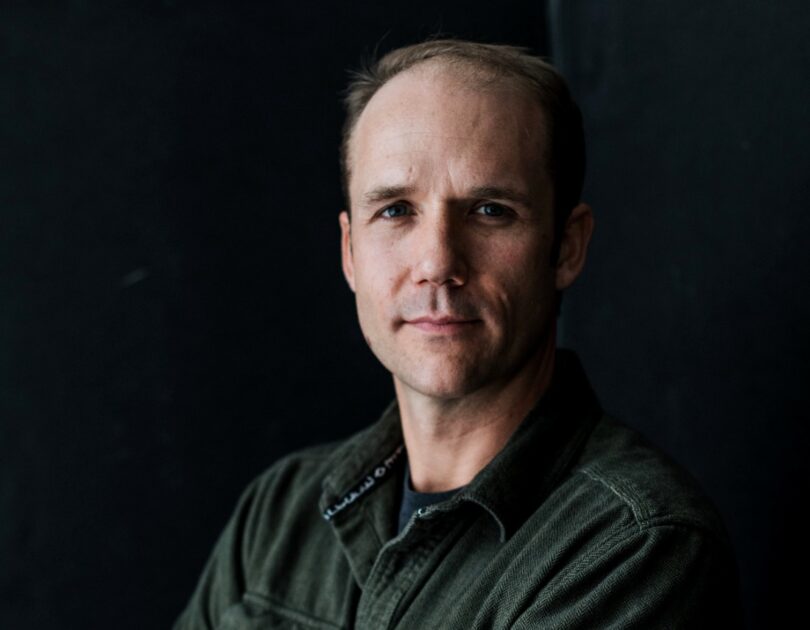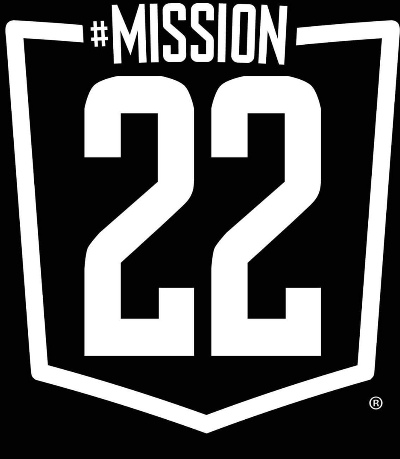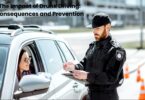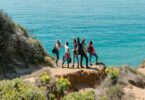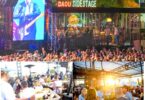Meet Magnus Johnson, CEO of Mission 22. As a former Green Beret, he dedicated an impressive 36 months of his life to serving in combat. Beyond his military service, Magnus is an adventurer, family man, writer, and artist, showcasing his diverse talents and passions.
During his time in the military, Magnus led a team that served as a beacon of inspiration, motivating thousands to rally behind noble causes. One of his most significant achievements was the orchestration of an immense steel-plate monument, a poignant symbol honoring veterans who tragically lost their lives to suicide.
Magnus’s valor and commitment to duty were recognized through prestigious accolades. He was bestowed with the Bronze Star Medal for Exceptionally Meritorious Service in Combat, and the Indiana House of Representatives commemorated him in the Congressional Record for his unwavering dedication to both country and community.
While his achievements are already remarkable, Magnus’s aspirations don’t stop there. His focus remains on contributing his expertise and skills to team projects, as well as finding solutions to complex human issues.
A crucial part of his life’s mission is now embodied in “Mission 22.” This organization provides vital support to veterans and their families precisely when they need it the most – right now. Through a comprehensive approach encompassing outreach, events, and diverse programs, Mission 22 strives to promote long-term wellness and sustainable growth for those who have served their nation.
We asked Magnus Johnson about holistic ways to improve the quality of life for veterans living with trauma. Here is this very informative and inspiring Q and A.
LA’s The Place: How can mindfulness and meditation benefit veterans living with trauma, and how can Mission 22 support them in incorporating these practices into their daily lives?
Magnus Johnson: First and foremost, mindfulness and meditation provide veterans with the tools to cultivate self-awareness and emotional regulation. Trauma can often lead to heightened stress, anxiety, and hypervigilance, making it difficult for veterans to find inner peace. By practicing mindfulness and meditation, veterans can learn to observe their thoughts and emotions without judgment, allowing them to develop a greater sense of control over their mental and emotional states.
Mission 22 helps equip veterans with the necessary tools and resources to promote their mental well-being and help them overcome the challenges of living with trauma. By embracing mindfulness and meditation, veterans can find solace, healing, and a renewed sense of purpose as they navigate their path to recovery.
LA’s The Place: What types of physical activities or exercises have proven to be effective in helping veterans manage trauma symptoms, and how does Mission 22 promote and encourage veterans to engage in these activities?
Magnus Johnson: Physical activity and exercise offer numerous positive benefits for veterans with post-traumatic stress disorder (PTSD). Here are some ways in which these activities can positively impact veterans; stress reduction, mood enhancement, sleep improvement, distraction and focus, social interaction and connection, self-confidence, physical health benefits.
One proven approach is aerobic exercise, such as running, swimming, or cycling. These activities increase endorphin levels, promote stress reduction, and enhance overall mood. Aerobic exercise can serve as a healthy outlet for veterans to release tension and reduce anxiety, thereby managing trauma symptoms more effectively.
Strength training is another valuable physical activity for veterans. It not only improves physical strength and fitness but also boosts self-confidence and self-esteem. By engaging in strength training exercises, veterans can regain a sense of control over their bodies and enhance their overall sense of well-being. At Mission 22, we actively promote and encourage veterans to engage in physical activities.
LA’s The Place: How does peer support and community involvement contribute to improving the quality of life for veterans living with trauma, and what initiatives does Mission 22 have in place to facilitate these connections?
Magnus Johnson: There is power in peer support and community involvement in improving the quality of life for veterans living with trauma. Connecting with peers who have shared experiences and engaging with a supportive community can have a profound impact on veterans’ well-being and their journey towards healing.
Peer support offers a unique understanding and empathy that comes from firsthand experience. Veterans living with trauma can benefit greatly from connecting with others who have walked a similar path. Sharing stories, offering mutual support, and providing a safe space for veterans to express their feelings and challenges can be incredibly therapeutic.
Community involvement provides a sense of belonging and purpose. Veterans often struggle with feelings of isolation or disconnection after their military service. Engaging with a supportive community not only helps combat these feelings but also allows veterans to contribute, give back, and find a renewed sense of purpose and meaning in their lives.
We have established peer support networks where veterans can connect with one another, share experiences, and provide emotional support. Mission 22 attends and/or organizes community events and activities that bring veterans together in a positive and supportive environment. These events provide opportunities for veterans to socialize, build connections, and engage in shared experiences that promote healing and well-being.
We encourage veterans to engage in volunteer work and community service. By giving back and being actively involved in their communities, veterans can experience a sense of fulfillment and purpose while making a positive impact on others’ lives. Additionally, we utilize digital platforms and online forums to facilitate peer connections and community involvement.
LA’s The Place: Could you share some examples of holistic therapies that have shown promising results in supporting veterans with trauma, and how does Mission 22 help veterans access these therapies?
Magnus Johnson: Holistic remedies can complement traditional treatments and support the overall well-being of individuals with post-traumatic stress disorder (PTSD). While it’s important to consult with healthcare professionals for personalized advice, here are some holistic remedies that are commonly used to combat PTSD:
A review published in the Journal of Traumatic Stress found that mindfulness-based interventions showed promise in reducing symptoms of PTSD, including intrusive thoughts, hyperarousal, and avoidance behaviors. Several studies have demonstrated improvements in PTSD symptoms, such as reduced anxiety and stress, improved emotional regulation, and enhanced overall well-being, among individuals who practiced mindfulness and meditation regularly.
Research studies have shown that practicing yoga or Tai Chi can lead to reductions in PTSD symptoms. A study published in the Journal of Clinical Psychiatry found that yoga-based interventions significantly reduced PTSD symptom severity, including anxiety, depression, and sleep disturbances. Similarly, another study published in the Journal of Traumatic Stress reported that individuals who participated in Tai Chi experienced improvements in PTSD symptoms and sleep quality.
While the evidence for acupuncture in treating PTSD is still limited, some studies suggest positive effects. A randomized controlled trial published in the Journal of Nervous and Mental Disease found that acupuncture was associated with reduced PTSD symptom severity and improved quality of life compared to a control group. However, more rigorous research is needed to establish its effectiveness.
Deep breathing exercises and other relaxation techniques have been shown to help individuals with PTSD manage anxiety, reduce hyperarousal, and improve sleep quality. A study published in the Journal of Clinical Psychology found that individuals with PTSD who practiced deep diaphragmatic breathing experienced significant reductions in anxiety symptoms.
Mission 22’s Recovery and Resiliency program incorporates mindfulness/meditation, herbal supplements, self-improvement reading material, breathing exercises and techniques, community exercise and physical activity, and education on nutrition to support PTSD symptoms.
LA’s The Place: In addition to the mentioned approaches, are there any other holistic methods or practices that Mission 22 recommends to veterans living with trauma to enhance their overall well-being and quality of life?
Magnus Johnson: In addition to the approaches previously mentioned, Mission 22 recommends considering the following holistic methods or practices to enhance the overall well-being and quality of life for veterans living with trauma:
Art Therapy: Engaging in art-based activities, such as painting, drawing, or sculpting, can serve as a creative outlet for self-expression, emotional processing, and healing. Art therapy has been shown to reduce symptoms of PTSD, enhance self-awareness, and promote a sense of empowerment.
Animal-assisted tTherapy: Interacting with animals, such as therapy dogs or horses, has been found to have a positive impact on individuals with PTSD. Animal-assisted therapy can help reduce anxiety, improve mood, increase socialization, and provide a source of comfort and companionship.
Music Therapy: Participating in music-based activities, listening to calming music, or learning to play a musical instrument can have therapeutic effects. Music therapy has shown promise in reducing symptoms of PTSD, promoting relaxation, and enhancing emotional well-being.
Nature-based Therapies: Spending time in nature, whether through outdoor activities, gardening, or ecotherapy programs, can offer a soothing and healing environment. Connecting with nature has been associated with decreased stress levels, improved mood, and increased overall well-being.
Mind-body Practices: Practices like qigong, Reiki, or energy healing techniques can promote a sense of balance, harmony, and relaxation. These modalities focus on the connection between the mind and body, aiming to restore energy flow and promote overall well-being.
It’s important to note that these holistic methods should be integrated into a comprehensive treatment plan and used in conjunction with evidence-based therapies.
Magnus Johnson’s journey is one of selfless dedication, inspiration, and a fervent desire to make a positive impact on the lives of veterans and their loved ones. Through Mission 22, he continues to be a driving force in transforming the way society supports those who have sacrificed so much for their country.
For more infomation, go to Mission22.com

